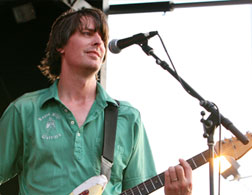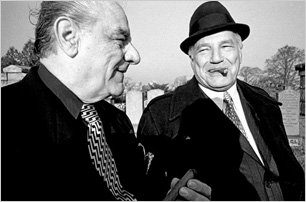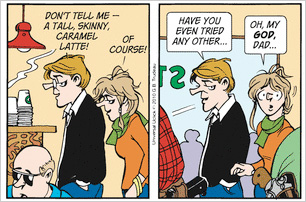
Pavement's Greatest HitsThe unthinkable has happened.
Posted Thursday, March 18, 2010, at 10:55 PM ETAlso in Slate, Zach Baron discusses the Pavement reunion and the end of baby boomer cultural hegemony.
 I come in peace to chat about Quarantine the Past (Matador Records), a new Pavement compilation with an ultra-fine title. Dropped on the occasion of a reunion tour, the name rings with the personality of what was "the finest rock band of the 90s," according to the certified accounting of Robert Christgau. Recontextualized as an imperative, the phrase sparks from a lyric on this record's first track, "Gold Soundz," a song like a chunk of quartz—jagged angles, splashy jangles, jazzy spangles in the yellow sun. It is a self-doubt song making the best of it as tunefully as its own title arrogantly promises.
I come in peace to chat about Quarantine the Past (Matador Records), a new Pavement compilation with an ultra-fine title. Dropped on the occasion of a reunion tour, the name rings with the personality of what was "the finest rock band of the 90s," according to the certified accounting of Robert Christgau. Recontextualized as an imperative, the phrase sparks from a lyric on this record's first track, "Gold Soundz," a song like a chunk of quartz—jagged angles, splashy jangles, jazzy spangles in the yellow sun. It is a self-doubt song making the best of it as tunefully as its own title arrogantly promises.
"You're empty and I'm empty, and you can never quarantine the past," is the lyric. The quick, foxy tail of the Q slides into a verb carrying the squawk of official alarm. The phrase is a mouthful for a marketing department to choke on. It is syncopated to measure the gravity of nostalgia and the pull against it, indicative of a lyrical voice that is often of several minds about any number of things, settling on ambiguity as a controlling idea and ambivalence as a point of view, cultivating a double-negative capability.
True to form, Pavement has directed the art of Quarantine the Past with an eye toward grotty collages and text scratched as if in the back of a trigonometry textbook. Here we have a hellfire prog-rock dragon warring, perhaps, with a phalanx of men hoisting a silhouetted flag—appropriate to a group that did notable work in the specialty subgenre of the throwaway anthem. No lyrics, no liner notes. The booklet credits the producers but not the players, which is in line with Pavement's cultivated air of obscurity—a standoffishness (and stepoffishness) entwined with its sense of itself as on one level a practical joke. At this writing, the band's bio on Matador's Web site pretty much just shuffles a few Pavement-appropriate names and dates into the text of the REM entry on the All Music Guide: "Pavement decided to return to being a rock band with 2006's Monster. … [T]he album won praise from a number of old-school critics who had been reluctant to praise the band, since they didn't 'rock' in conventional terms." You don't need Freud to tell you about the hostility of pranksters.
The record has 23 songs, recorded between the winter side of 1989 and 1999's end of the party. Sequenced asynchrously, perhaps in the belief that the concepts of artistic progress and linear time are a touch overrated, it is engineered such that apprentice work and mature numbers flow together and the mood of the whole swings smoothly. It would be churlish to carp that Pavement has erred in excluding "Texas Never Whispers"—and churlishness is among the band's modes—and the carper would have to concede that it was right to include "Debris Slide." That number is ace punk-pop, its title phrase sung as if a debris slide involved ripping a wave or nailing a skateboard trick, but anyway, let's not be churlish. Quarantine the Past rates as "the best of Pavement," as a subtitle printed on a sticker says. It looks pretty good next to, and even between, the two volumes of the Eagles' Greatest Hits.
The concept of Pavement's Greatest Hits is unthinkable, it having had only one fractional hit in "Cut Your Hair" in 1994, when, according to the claims of hype, Pavement was the "smart Nirvana" and the "next Nirvana." The band showed an obstinate disinterest in living up to those claims, and the obstinacy was part of the act. This pose—something like the "calculated surliness" Ralph Ellison heard in John Coltrane—partly involved writing songs about songs. "And we're coming to the chorus now," says the last line of the first verse of "Gold Soundz." Clever. Too clever? What do you have against cleverness? "In the best of songs," writes the critic and Dylanologist Christopher Ricks, "there is always something about what it is to write a song without in any way doing away with the fact that it is about things other than the song."
To trip the nostalgia trap: 1994 was a year for "Loser" and "Gin & Juice" and Parklife and "Cornflake Girl," the year of Pearl Jam vs. Ticketmaster and Kurt Cobain with a shotgun. We were up against the Dave Matthews Band, Hootie and the Blowfish, and Korn. On the strength of "Cut Your Hair," a song about girls and boys and artists and repertoire, Pavement had its broadest brush with the mainstream, going on Jay Leno's Tonight Show, five young men in no hurry.
on the Fray
-
Health care bill will require new restaurant menus that include calorie counts http://bit.ly/cd7ZTF
-
Become a fan of Slate on Facebook http://bit.ly/4EGWiY Follow us on Google Buzz http://bit.ly/aanSOz
-
Haliburton withdraws appeal in Jamie Leigh Jones rape case http://bit.ly/dB9Dwh
 Shafer: What Ross Douthat Overlooks About Conspiracy Theorists
Shafer: What Ross Douthat Overlooks About Conspiracy Theorists Why Do Investors Keep Making Bad Bets Against Obama?
Why Do Investors Keep Making Bad Bets Against Obama?  Strange YouTube Trend: The Girls Who Want To Show You the Clothes They Just Bought
Strange YouTube Trend: The Girls Who Want To Show You the Clothes They Just Bought Slate's Sports Experts Size Up the Sweet 16
Slate's Sports Experts Size Up the Sweet 16 Companies Get Paid To Use Less Energy. Why Not Homeowners Like Me?
Companies Get Paid To Use Less Energy. Why Not Homeowners Like Me? Obama's Bold Plan To Fix America's Lousy Internet Connection
Obama's Bold Plan To Fix America's Lousy Internet Connection














